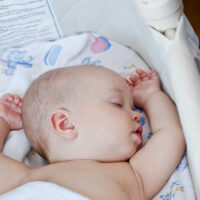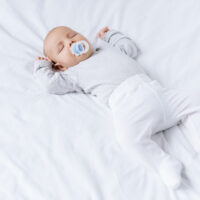The American Academy of Pediatrics recommends against using any type of bug spray on baby’s under two months- so how do you keep mosquitoes away from your little one? Below, you’ll find everything you need to know about how to keep mosquitoes away from baby at night. You’ll also find some guidance on when you can use bug spray on baby and the type of mosquito repellent that is safest.
Tips for Keeping Mosquitoes Away
1. Use a Mosquito Net
If your baby is in a playpen or car seat, a mosquito net helps keep bugs away. A mosquito net is made of fine mesh. Your baby can still breathe comfortably and see through the net. However, mosquitoes cannot penetrate the small holes. Some children’s tents may work as well.
2. Dress Baby to Prevent Mosquitoes
If you take your baby out when mosquitoes are active, one of the best ways to keep mosquitoes off them is to keep them covered. Use long pants and sleeves to cover exposed skin. You’ll also want to be sure that your baby wears an onesie or that you tuck your baby’s shirt into their pants so mosquitoes don’t attack their lower back and tummy.
To keep your baby from overheating, choose a breathable material like knit or cotton. You’ll also want to dress them in loose-fitting clothing since it can prevent mosquitoes from getting to your little one’s skin. Mosquito bites can still penetrate tighter clothes.
In addition to choosing lighter clothing, you’ll want to avoid black, dark blue, and red. These colors attract mosquitoes.
3. Avoid Peak Mosquito Areas
Mosquitoes love damp, wet places for laying their eggs. Puddles, backyard pools, woody areas, and other bodies of water are breeding grounds for mosquito larvae. Dusk and dawn are also times when mosquito activity is highest, so it may be best to plan outings with your little one around these things. You should also be sure to keep stagnant water away from your house; drain birdbaths and wading pools regularly and watch planters for signs of being wet.
4. Apply Mosquito Repellent as Needed
The AAP recommends that mosquito repellent be used on babies as early as two months, while sources like the National Health Institute recommend waiting until six months. There are many complications that can arise following a mosquito bite, especially since your baby has not been desensitized to them.
Mosquito repellent with a concentration of up to 10% DEET can be used on babies once per day. Since mosquitoes are most active during dusk and dawn, you’ll want to apply when you plan on being outside during these times. A concentration with 10% DEET works for 2-3 hours, so try to limit being outside to just a few hours or use an alternative to mosquito repellent- like a mosquito net or bug bracelet. You can start applying more frequently (2-3 times per day) once your child is over two years old.
5. Keep Mosquitoes Out of the House
Mosquitoes are drawn to light, so it’s likely they’ll sneak into your home if there are any openings. Be sure that any open windows have screens over them and that you keep doors closed, especially during active mosquito hours at dusk and dawn.
6. Avoid Fragrances
Mosquitoes are attracted to fragrances from lotions, perfumes, and soaps. Try to use fragrance-free alternatives for you and your baby during the summertime. Mosquitoes (and other insects) are more attracted to scents that smell sweet or floral.
7. Use Mosquito-Repelling Fragrances
Something else you can use to keep mosquitoes away from the environment is candles, Tiki torches, and incense that repel mosquitoes. They often make use of scents that mosquitoes dislike including citronella, lavender, neem, lemongrass, eucalyptus, and soybean to repel them.
You should note that you should not rely on these types of products alone. They are not as effective as mosquito repellent and won’t work if your baby isn’t in the immediate area. You’ll also want to be sure your child is away from any flames or burning repellents, especially if they can crawl or walk.
How to Safely Apply Mosquito Repellent to Babies
Choosing a Mosquito Repellent
According to the CDC, you can safely use DEET containing repellents with concentrations of up to 30% on babies older than two months. With DEET, you should use the minimum amount you need to go outside. If you’ll only be out for an hour or two, a concentration of 10% should be sufficient. Concentrations of 30% usually last 5-6 hours and you should wait until your baby is over the age of two before applying a concentration greater than 10%.
Once you are ready to choose a bug repellent, there are several options safe for younger children. You can find our recommendations for the best bug repellent here.
There are some products that contain both sunscreen and bug spray. While these might seem more convenient, keep in mind you’ll likely need to reapply sunscreen before you need to reapply the bug spray. It’s best to buy a separate product so you don’t use too much DEET or other ingredients on your little one’s skin.
Active Ingredients
Even though we usually think of DEET in terms of mosquito repellent, there are also brands that contain the ingredients Picaridin and IR3535. While these are considered milder, DEET has been proven most effective.
Something to keep in mind as you look over active ingredients is that ‘all natural’ doesn’t mean safe. For example, lemon eucalyptus oil is a common additive in more natural bug sprays, however, it is not recommended for use in babies under three. You should never choose a product that doesn’t have guidelines as to when you can start using it on a child. Additionally, you should consult your pediatrician if you have any questions.
How to Apply Bug Spray to a Baby
To safely apply mosquito repellent to your baby, start by spraying it into your hand. By applying it indirectly, there’s less risk of inhaling the bug spray. Alternatively, you could use a balm or lotion that isn’t sprayed into the air. (However, this doesn’t apply easily to clothes and you’ll want to apply the spray to clothing rather than your baby’s skin when it’s possible).
You should only apply mosquito repellent to baby skin where it is exposed. Since your little one is likely to put their hands in their mouth, avoid applying it to their hands and try to spray it on their clothes instead of bare skin as much as possible. You should also avoid putting it on any open skin (like scratches or rashes).
To apply to your baby’s face, put a small amount on your hand and dab it on areas like their forehead and cheeks. You can also put a hat on your baby and spray that with bug spray instead.
After everyone is done having fun, take your baby inside and give them a bath. This will wash away any of the DEET that is still on their skin.
FAQs about Keeping Mosquitoes Away from Baby at Night
Do babies need mosquito repellent?
Mosquito bites on babies tend to swell up more than those in adults, resulting in itchy and painful lumps that make your little one uncomfortable. Baby mosquito bites can even result in bruising or infection from diseases like West Nile Virus.
Mosquito repellent is one of the best defenses against mosquitoes when you’re outside at night. Even though mosquitoes are dangerous, you should note that the American Academy of Pediatrics advises against using any insect repellent on babies under 2 months, even mosquito repellents that are free of DEET. Additionally, parents should avoid the use of products containing lemon eucalyptus oil until their child is at least three years old.
Once your baby is older than 2 months, you can apply a mosquito repellent up to once per day. After age 2 years, you can apply concentrations of 10% up to 3 times per day until your child is over 12 years of age.
Something to note is that higher concentrations of DEET are NOT more effective- they just last longer. Therefore, you may need to reapply mosquito repellent more frequently on children because you should be using a lower concentration of DEET.
Can babies get sick from mosquito bites?
Yes, babies can get sick from mosquito bites. In addition to baby mosquito bites swelling more, mosquitoes may carry West Nile Virus or cause other complications. While West Nile Virus only causes mild, flu-like symptoms, severe cases may cause inflammation of the brain or spinal cord and even death.
While most mosquitoes don’t carry West Nile Virus, you’ll also want to look for signs of a bad reaction. Mosquito bites are most likely to cause severe bite reactions in babies, people with compromised immune systems, and adults that haven’t been exposed (and de-sensitized) to the breed of mosquito that bit them. If your baby has swollen lymph nodes, develops hives, or starts wheezing, it could be a sign of a severe allergic reaction and you’ll want to take them to the emergency room.
Common Mosquito Bite Complications
Babies might also get sick if bites get infected and develop a fever. If your child does have a fever from a bug bite, you will want to take them to be looked at by their pediatrician. You should also take them to be evaluated if the bite appears infected such as if there are signs of pus or the bite is deep red and hot to the touch. Some common complications associated with mosquito bites include:
- Cellulitis- This is a bacterial infection of the skin. It results in an area of redness that spreads out from the bite, often being painful to the touch.
- Lymphangitis- This results in a red line that moves up the arm and leg through the lymph channels. Since this type of infection moves into the bloodstream, it results in sepsis which can be very severe or even deadly.
- Impetigo- Impetigo is caused by picking or scratching at the bites, so it’s most common in itchy bites. It results in soft scabs, sores, and pus.
What should I do if my baby is bitten by a mosquito?
If you catch a mosquito munching on your little one, use your hand to sweep it away and off the skin. Then, you should ice the area. Treating a bug bite with ice helps reduce swelling and decrease itchiness. Do not apply ice directly to the skin (this can cause frostbite and may harm your child’s sensitive skin). Instead, wrap the ice cube in a washcloth first.
You can also apply hydrocortisone cream or calamine lotion to the area to help curb scratching. (Expert tip: Put the hydrocortisone cream in the refrigerator first if your baby is experiencing any pain for an extra cooling effect).
For painful bites, use a baking soda paste. Combine a little water with baking soda until you have a paste. Apply this to the bites and let sit for 15-20 minutes before wiping away.
In most cases, your baby will not need to see their doctor for a mosquito bite unless they have a severe reaction or the bite becomes infected. Look for signs of spreading redness or a bite that is painful or hot to the touch. You should also go to the doctor if your baby develops a fever or if there is a crustiness with yellow pus, because this indicates an infection. Finally, beware of swollen bites that are hard to the touch with red pus underneath.
Final Word
Not only do mosquitoes carry disease, but they also result in swollen, itchy bites that often swell up more on babies than they do in adults. Scratching also puts your baby at risk of infection. With all the possible risks, it’s important that you take steps to prevent mosquito bites before they become an issue.
Hopefully, you are now armed with several strategies on how to keep mosquitoes away from baby at night. The best line of defense against mosquitoes is preventing them in the area as much as possible. Additionally, you can use baby-safe mosquito repellent on babies over two months and use other mosquito-repelling products when possible.






